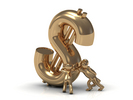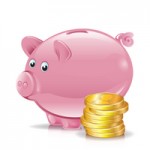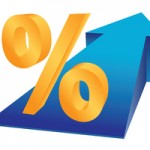 When it comes to investing, Certificates of Deposit (or “CDs” for short) are among the best products for beginners. They are FDIC insured, which means that unlike stocks and bonds your principal investment is insured against loss. And in exchange for agreeing to keep your money on deposit for a term of a few months or years, the bank offers a higher interest rate than your standard savings account. Unfortunately CD rates are fairly low now, however they often pay more than the meager rates that are paid for savings accounts.
CDs are easy to understand and set up....
When it comes to investing, Certificates of Deposit (or “CDs” for short) are among the best products for beginners. They are FDIC insured, which means that unlike stocks and bonds your principal investment is insured against loss. And in exchange for agreeing to keep your money on deposit for a term of a few months or years, the bank offers a higher interest rate than your standard savings account. Unfortunately CD rates are fairly low now, however they often pay more than the meager rates that are paid for savings accounts.
CDs are easy to understand and set up.... How to Find the Best CD Rates
Thursday, June 20th, 2013
 When it comes to investing, Certificates of Deposit (or “CDs” for short) are among the best products for beginners. They are FDIC insured, which means that unlike stocks and bonds your principal investment is insured against loss. And in exchange for agreeing to keep your money on deposit for a term of a few months or years, the bank offers a higher interest rate than your standard savings account. Unfortunately CD rates are fairly low now, however they often pay more than the meager rates that are paid for savings accounts.
CDs are easy to understand and set up....
When it comes to investing, Certificates of Deposit (or “CDs” for short) are among the best products for beginners. They are FDIC insured, which means that unlike stocks and bonds your principal investment is insured against loss. And in exchange for agreeing to keep your money on deposit for a term of a few months or years, the bank offers a higher interest rate than your standard savings account. Unfortunately CD rates are fairly low now, however they often pay more than the meager rates that are paid for savings accounts.
CDs are easy to understand and set up.... When Should You Tap Into Your Emergency Savings Account?
Tuesday, May 28th, 2013
 If you’re following sound financial advice then you’ve built up a good-sized emergency savings account. And you’ve resisted the temptation to use this fund for splurges like a vacation or a new car. But you may have asked yourself when exactly it makes financial sense to go ahead and tap into that emergency savings account.
In general, you should be comfortable using your emergency savings for expenses that fall outside of a well considered budget plan. Even the best planned budgets can be hit with something unexpected.
Here are some examples of situations in which it would likely make sense...
If you’re following sound financial advice then you’ve built up a good-sized emergency savings account. And you’ve resisted the temptation to use this fund for splurges like a vacation or a new car. But you may have asked yourself when exactly it makes financial sense to go ahead and tap into that emergency savings account.
In general, you should be comfortable using your emergency savings for expenses that fall outside of a well considered budget plan. Even the best planned budgets can be hit with something unexpected.
Here are some examples of situations in which it would likely make sense... 5 Best Places to Park Cash
Friday, May 3rd, 2013
 Investing your long-term savings and retirement accounts will generally be the best way to maximize the value of those accounts over time. But you’ll always need to have a portion of your savings in a form that you can quickly spend, such as your emergency fund for example.
But having highly liquid accounts doesn’t necessarily mean cash, or at least not literally. After all, while you may want to keep a small supply of physical cash on hand, you certainly don’t want to keep tens of thousands of dollars from your emergency fund in cash in an envelope under your...
Investing your long-term savings and retirement accounts will generally be the best way to maximize the value of those accounts over time. But you’ll always need to have a portion of your savings in a form that you can quickly spend, such as your emergency fund for example.
But having highly liquid accounts doesn’t necessarily mean cash, or at least not literally. After all, while you may want to keep a small supply of physical cash on hand, you certainly don’t want to keep tens of thousands of dollars from your emergency fund in cash in an envelope under your... Time to Open a Money Market Account?
Wednesday, April 10th, 2013
 When you open a new savings or checking account at your local bank or credit union, you may be asked if you also want to open a money market account. Money market accounts are similar to savings accounts except that they generally offer higher interest rates, have a higher minimum balance requirement, and only allow you to make a few withdrawals each month.
If you’ve never had a money market account before, then you might not be familiar with the situations in which having such an account makes good financial sense.
Here are some instances in which it might be...
When you open a new savings or checking account at your local bank or credit union, you may be asked if you also want to open a money market account. Money market accounts are similar to savings accounts except that they generally offer higher interest rates, have a higher minimum balance requirement, and only allow you to make a few withdrawals each month.
If you’ve never had a money market account before, then you might not be familiar with the situations in which having such an account makes good financial sense.
Here are some instances in which it might be... 10 Money Mistakes that Hurt Young Adults
Tuesday, February 12th, 2013
 It’s easy to make financial mistakes when just starting out. Even after graduating high school, trade school or college there are still going to be a lot of things that must be learned, particularly in the area of personal finance.
Money mistakes that a person makes when they are young can be some of the most devastating, even if the financial value of the mistake is relatively small. We’re constantly being evaluated through the activity on our credit reports, so mistakes that are made early in life can have a negative effect for many years.
Also, not focusing on saving...
It’s easy to make financial mistakes when just starting out. Even after graduating high school, trade school or college there are still going to be a lot of things that must be learned, particularly in the area of personal finance.
Money mistakes that a person makes when they are young can be some of the most devastating, even if the financial value of the mistake is relatively small. We’re constantly being evaluated through the activity on our credit reports, so mistakes that are made early in life can have a negative effect for many years.
Also, not focusing on saving... What is APY?
Wednesday, January 30th, 2013
 With interest rates on savings accounts and bank CDs at long term lows, it’s important for savers to make sure they’re getting as much as possible on their accounts. But it can be difficult to figure out which account pays the highest effective rate, since there are different ways to compound interest, as well as different deposit terms for things like bank CDs. This is why it’s important to know the “Annual Percentage Yield” (or “APY”) for each type of account.
What is APY? Annual Percentage Yield is a way of calculating a standardized rate that enables savers to compare...
With interest rates on savings accounts and bank CDs at long term lows, it’s important for savers to make sure they’re getting as much as possible on their accounts. But it can be difficult to figure out which account pays the highest effective rate, since there are different ways to compound interest, as well as different deposit terms for things like bank CDs. This is why it’s important to know the “Annual Percentage Yield” (or “APY”) for each type of account.
What is APY? Annual Percentage Yield is a way of calculating a standardized rate that enables savers to compare... Is Your Bank Reducing Your Savings Balance With More Fees?
Monday, November 19th, 2012
 With banks and credit unions paying such low interest rates on savings accounts, it seems like it’s more difficult than ever to grow the balances in our accounts. Adding to the challenge of increasing the value of your savings account is the fact that many banks are starting to impose new fees on some types of savings accounts.
In addition, in light of recent legislation that regulates and prohibits banks from charging certain types of fees, or fees above certain amounts, some banks have created new fees in order to replace those lost fees.
Here are some ways that your...
With banks and credit unions paying such low interest rates on savings accounts, it seems like it’s more difficult than ever to grow the balances in our accounts. Adding to the challenge of increasing the value of your savings account is the fact that many banks are starting to impose new fees on some types of savings accounts.
In addition, in light of recent legislation that regulates and prohibits banks from charging certain types of fees, or fees above certain amounts, some banks have created new fees in order to replace those lost fees.
Here are some ways that your... How to Save $1,000 in Thirty Days
Friday, November 9th, 2012
No one would argue that saving isn’t an important component of a healthy financial plan, but “saving” is merely a concept. Without having an idea of why saving is important, how much you need to save, and how you intend to get there, it can be difficult to make any progress.
The best way to save is by having a goal for the amount you want to save, and a timeframe for doing so. Without a goal you won’t know whether you’re saving enough, and therefore won’t be able to come up with a plan to achieve. Wouldn’t it be...
Banking Advice on How to Set Up an Emergency Savings Account
Thursday, July 12th, 2012
One of the key principals on the path to financial independence is to build up an emergency or “rainy day” fund. The purpose of such a fund is to provide you with a financial cushion in the event that you lose your job, are involved in an accident or are otherwise faced with significant unexpected expenses that your normal income can’t cover.
The traditional advice is to build up your emergency savings account until it contains at least six months’ living expenses. But given the increasingly longer times that many individuals are finding themselves out of work, you might wish...
How to Save an Extra $50 Each and Every Week
Thursday, May 17th, 2012
 One of the most important pieces of financial advice you’ll ever receive is the importance of getting into the habit of saving money. This holds true regardless of your financial position, and whether you’re trying to save a lot or a little each week.
If there’s any downside to being on a regular savings program, it’s that sometimes we get so used to saving a certain amount each month we aren’t necessarily saving as much as we could be. In fact, regardless of the financial situation you find yourself in, it’s quite likely that you’ll be able to save an...
One of the most important pieces of financial advice you’ll ever receive is the importance of getting into the habit of saving money. This holds true regardless of your financial position, and whether you’re trying to save a lot or a little each week.
If there’s any downside to being on a regular savings program, it’s that sometimes we get so used to saving a certain amount each month we aren’t necessarily saving as much as we could be. In fact, regardless of the financial situation you find yourself in, it’s quite likely that you’ll be able to save an... 

